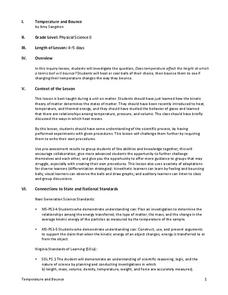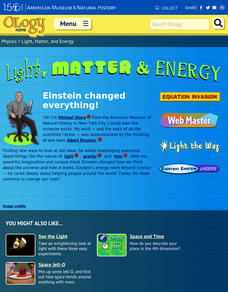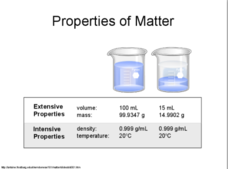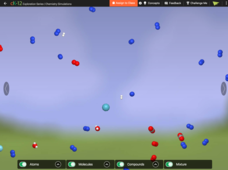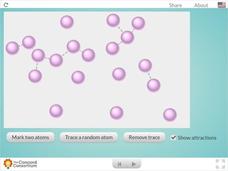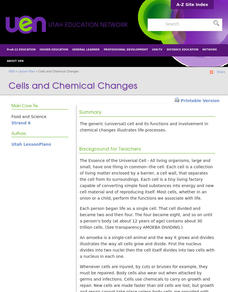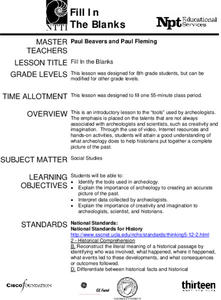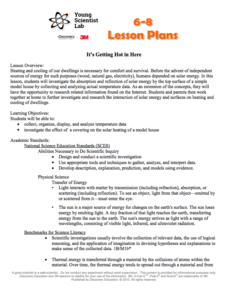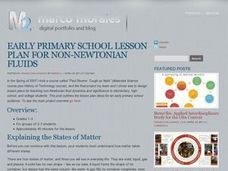Curated OER
What's The Matter?
Fourth graders accurately describe various states of matter, Through experimentation, they change a variable to create a new state of matter. Students record their observations about the way matter is changed and the changes that occur...
Curated OER
Changing Matter
Fifth graders conduct an experiment. In this changing matter lesson plan, 5th graders receive a cup of crystals, record their observations, add water to the crystals and record new observations. Students then discuss the differences...
Curated OER
Changes of State
Students examine molecules and the changes in energy of a system. In this energy systems lesson students complete a lab activity and describe changes of state.
Curated OER
Water and Ice
Young scholars explore water as it changes states of matter. In this physical property lesson, students use observation, measurement, and communication skills to describe changes in water as it goes from a solid to a liquid and back again.
STEM for Teachers
Temperature and Bounce
Take part in a fun experiment and hold an impromptu bouncing contest with your class. Young scientists heat and cool balls before bouncing them to determine whether temperature changes affect how they bounce. The set of STEM lesson plans...
American Museum of Natural History
Light, Matter and Energy
Let Einstein's work shine the way. Pupils read about Einstein's iconic equation, E=mc^2, using a remote learning resource and see how ideas from other scientists such as Kepner, Curie, Galilei, and Newton led to its discovery. They...
Normal Community High School
Density
Change the density of water by adding minerals. The presentation discusses density—from the definition to calculations—and applies it to the real world. It briefly mentions specific gravity, and finishes by showing Archimedes' principle.
Institute of Electrical and Electronics Engineers
Heart of the Matter
Hands-on experience with valves and water flow supports young researchers' understanding of valve operation. Attached resources for learners are text-dense; I'd break up the text into smaller pieces for groups to read and present...
Curated OER
Particle Model of Solids, Liquids, and Gases
Display the arrangement of molecules in solids, liquids, and gases. Demonstrate how the addition of heat energy results in greater molecular motion and therefore a change of phase. Give examples of heat conductors and insulators, and...
Concord Consortium
Molecular View of a Liquid
Pour on the knowledge with an engaging states of matter interactive! Young physical scientists view the atoms within a liquid to explain what gives a liquid its unique properties. The resource allows users to highlight and observe two...
Steinhardt Apps
Kinetic Molecular Theory
Building off young chemists' knowledge of the states of matter, kinetic molecular theory is the focus of the unit. Eight days of lessons including multiple demonstrations, one lab experiment, directed instruction, and worksheets,...
CK-12 Foundation
Air Matters
What makes up the air we breathe? Young scientists explore the atoms and molecules in the air. An interactive lesson allows individuals to watch the movement of the particles in the air and change the makeup from a mixture to a compound....
Curated OER
Understanding the Cosmic Microwave Background (CMB)
How did our universe really begin? Explore the Science Big Bang Theory and Cosmic Microwave Background (CMB) with this multiple activity-based lesson that demonstrates that the increase of density due to the decrease of temperatures,...
Curated OER
Observations of Properties of Matter
To guide learners through observations of chemical samples in the lab, this resource asks them to give all formulas and complete the attached data sheet. There are multiple questions about categories of elements and general behavior,
NASA
Melting Ice: Designing an Experiment
Sometimes, despite the best laid plans, the unexpected will occur. Learners witness this firsthand as they carefully design an experiment to determine the time needed for ice to melt in salt water or pure water. They uncover facts not...
Concord Consortium
Molecular View of a Gas
Welcome to the fast-paced life of a gas atom! Learners gaze at gaseous atoms up close using a colorful interactive. They can highlight two atoms and observe their movements within their container or follow the dizzying path of one atom...
Curated OER
Cells and Chemical Changes
The billions of cells that make up all living things are the focus of this resource. Understanding the differences between the cells that make up plants and animals is an important distinction; it is covered here quite-well. Some...
Curated OER
Critical Ways of Seeing The Adventures of Huckleberry Finn in Context
Young scholars complete a unit of lessons examining the cultural context of the novel, 'The Adventures of Huckleberry Finn.' They write a critique of the novel, compare/contrast two published critiques, and explore various websites.
Curated OER
Fill in the Blanks
Archaeologists, historians, and scientists all work together to create a timeline of our past. Engages learners in a series of activities that all filter through the NOVA video, "Mysteries of the First Americans." Each activity is...
Discovery Education
It's Getting Hot in Here
Class members engage in a STEM experiment and investigate how materials affect heating in a house by creating models of houses and using different top surface materials. They record the temperature inside the models and consider what the...
Lewiston High School
Weight and Mass & Forces in Equilibrium
I would weigh less on the moon? Send me there, then! On the top of the first page, a cartoon image demonstrates the difference between Earth and the moon. It then goes on to describe weight and mass and provides five practice problems...
K12 Reader
Character Analysis in the Red Badge of Courage
As part of a comprehension exercise, readers analyze the character of Henry Fielding and consider how his romantic view of himself, and of war, changes.
Curated OER
Constancy and Change
Second graders identify three forms of matter- solids, liquids, and gases with 100% accuracy. They observe what happens when they try to put two kinds of matter into the same space and conclude that solids, liquids, and gases occupy space.
Curated OER
Non-Newtonian Fluids
Learners will use water, cornstarch, eggs, and more to explore the different states of matter. They will make observations of an unknown substance called "Oobleck" and test its liquid and solid properties. This would be a great lesson to...
Other popular searches
- Chemical Changes in Matter
- Physical Changes in Matter
- Phase Changes in Matter
- Changes in Matter Activities
- Changes in Matter Water
- Changes in Matter Chemistry
- Matter Changes in State
- Changes in Matter/ Shadows
- Changes in Matter Presentation
- Changes in Matter Properities






